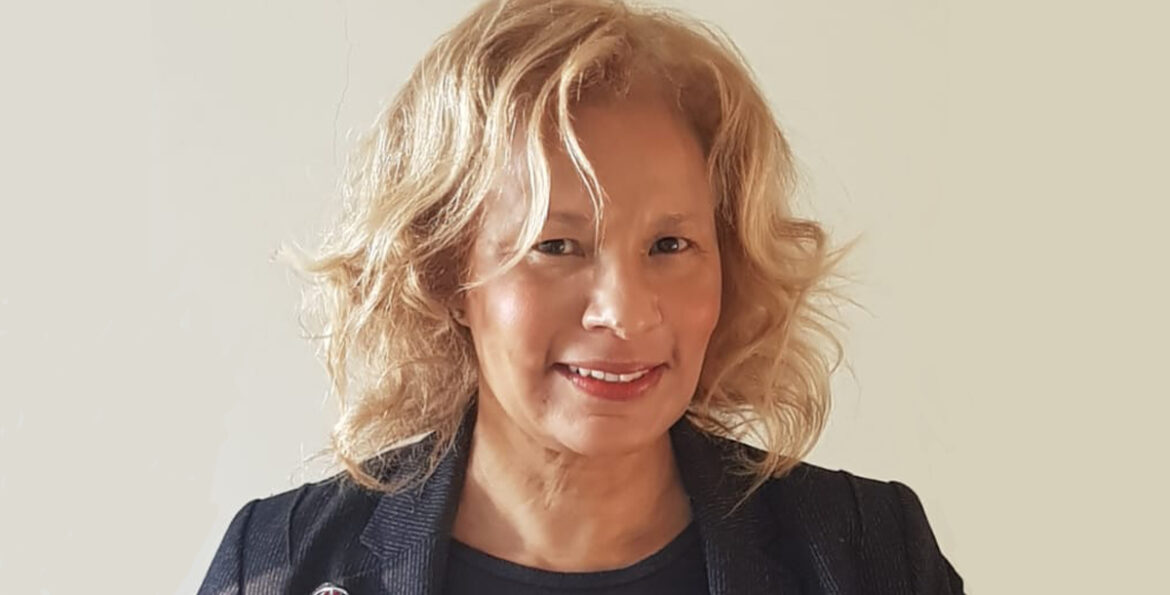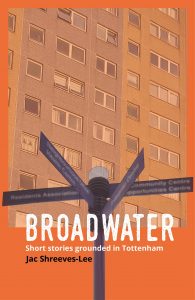

Jac Shreeves-Lee: Interview
- 15th September 2020
- Category : Blog,Interviews & Blogs
Jac Shreeves-Lee’s debut short story collection, Broadwater, was published by Fairlight Books on 3 September 2020. In Broadwater, Jac gives voice to the people of Broadwater Farm, one of the most well-known housing estates in Britain. A place where post-war dreams of concrete utopia ended in riots, violence and sub-standard housing. Read this interview with Jac to find out what inspired this collection.
How did you start writing?
At age four I drew squiggles and pretended they were letters that formed words. I would ‘read’ them and make up stories for all my dollies. Cindy, Big Ted and Bobby made the perfect audience because they couldn’t question or contradict anything I ‘read’ to them.
My parents regularly wrote to their families in Jamaica. They would sit down at the dining table and write long, detailed letters in little, blue airmail packages that folded and unfolded like origami. The letters received from Jamaica would lessen any feelings of homesickness and bring Montego Bay bouncing into our home as they read the letters aloud and caught up on the ‘goings-on’ back home. Sometimes they laughed, sometimes they cried.
What does writing mean to you?
Breath. Writing brings me more joy than anything else. I love the physical connection of thought, heart, pen and paper – the excitement and prospect of sharing ‘word-pictures’ with others, creating shapes that others might ‘get’. I write because this is what I have always done, I don’t seem to have a choice. I am never more ‘me’ than when I am writing.
You’ve worked as a magistrate and clinical psychologist . Have these professions influenced your creative writing? If so, how?
I have always done ‘people work’. I qualified as an educational psychologist when I was twenty-six and before that I worked as a secondary school teacher in a comprehensive school where I taught English. About fifteen years ago I retrained and became a clinical psychologist. As an educational and clinical psychologist one writes letters and reports but communication in all its various forms is central.
The reports written tend to be objective and forensic – and the goal is always to illuminate and help others to either better understand themselves, a complex situation or another individual and to provide clinical and professional advice and guidance in an enabling, insightful and therapeutic way.
Serving effectively as a magistrate demands empathy and attention to detail. The roles of psychologist and magistrate also require good observation skills. Concentration, curiosity and observation are core, and these are needed by keen writers of creative fiction, too. These vocations have influenced my writing by affording me the great privilege of having regular and meaningful contact with people from all walks of life. My understanding of the complexities of emotional attachments, character and character development have deepened – and I am increasingly struck by the strange vicissitudes of life.
Do you feel like your writing style has changed over the years?
Yes, doing the MA in Creative Writing at Birkbeck University was a huge turning point. Martina Evans’ brilliant poetry module taught me about ‘how words work’, and switched a light on that up to that point hadn’t really been working. My other tutors, Russell Celyn Jones, Julia Bell and Richard Hamblyn, also enlightened me about the art of writing good fiction, including the crucial aim that each word should say and feel exactly what you mean it to; and to keep writing and editing until they do.
If you could describe Broadwater in one word what would it be?
I like to think Broadwater is too nuanced and complex for one word. If I’m allowed three immodest words, how about ‘authentic’, ‘ heartfelt’, ‘vibrant’? A book that loves back and gives everyone a voice.

What inspired you to write this book? Did you start writing it with the format of a collection in mind or did that come later?
The old truism holds good, ‘write about what you know’, and I think that’s what I’ve done. I feel that I know these streets and people. I grew up playing on the fields that were overlooked by the Broadwater Farm estate and Tottenham remains a very strong part of my identity, heritage and personal story. My starting point for the collection was a strong sense of character and the sense of place grew from these characters.
Each story is written from the perspective of a different character. How challenging was it to inhabit so many lives? Were some stories easier to write then others?
When I wrote the stories I became immersed in each character – and thought, felt and saw the world through their particular eyes and with their world view. In a way I became each character and thought and felt the way they did. Some characters were easier to inhabit than others. I enjoy writing from the point of view of characters who are least like myself because with these characters my imagination has no limits and I can have endless fun – but with characters more similar to myself, my imagination is perhaps more influenced by what I know.
The Broadwater Farm Estate in Tottenham, which is the location of the collection, is almost a character in itself. Why did you choose this as the location of the story?
I care very much about the Broadwater Farm estate and Tottenham – always will. It’s weird but whenever I visit a town outside of London and pop into a bakery shop I always feel bizarrely proud to see lurid pink Tottenham cakes. Tottenham is a buzzing, lively place with heart and rhythm but it has tended to be viewed (by some) as a ‘trouble spot’ and my hope is to help shift this view of Broadwater Farm and Tottenham towards a perspective which is more accurate, hopeful and insightful.
What’s the most surprising thing you’ve learned through your writing?
Wonderful and unexpected responses from so many people. One young woman posted that she couldn’t put the book down because she loved reading about the streets and places she knew. Another reader, Frank, said ‘Broadwater is our story, it’s our Hood. Thank you, Jac.’
What do you hope people take away from reading your book?
I love the idea of book groups on both the west and east sides of Haringey enjoying Broadwater but I’m even more excited by the prospect of young people who may not usually be avid readers, enjoying it. It is my hope that each reader will find themselves or someone they know reflected, and in this way, grasp the central message of Broadwater which is that our human connectedness overrides any differences that can sometimes sadly divide us and keep us apart.
What’s your favourite book and who is your favourite author?
What a tough question… How to choose… but how not to mention Toni Morrison, Alice Munro, Raymond Carver, Zora Neale Hurston, Rose Tremain, Elena Ferrante, Octavia Butler? Sorry this has turned into a reading list. Favourite book? Choose one written by any of the above.
Do you have a pet peeve when it comes to writing? Something you notice yourself doing or something you pick up in other’s writing?
Anything over-indulgent. Point of view shifting from paragraph to paragraph is a niggle but I’m also aware that it is a very slippery slope to criticise the writing style of other writers.
Do you have a writer’s habit that helps you ‘get in the zone’?
Reading poetry.
Do you have a writing schedule?
I carry a notebook or mobile and I jot down anything and everything that impresses me – perhaps something I’ve seen, overheard. I try to be alert and alive to everything that is happening around me – the top deck of the 41 or 29 bus is often very inspirational.
Where do you tend to write?
I write in so many places – not just my back room. I write on tubes, trains, planes and in coffee shops, and often in waiting rooms – some of my best ideas have come to me when I’ve been waiting.
What’s a piece of advice you can give to aspiring authors?
Trust what you see, what you know, what you feel, what you experience. Keep writing about everything, anything. Use all your senses to create your written world. Keep reading – everything and anything – your favourite writers and those whose writing you don’t like and try to work out why you don’t like this kind of writing. This will help clarify your thinking about what kind of writer you want to be. Read poetry, novels, graphic novels, writing that will inspire you and try to write the novel or short stories you would want to read. Join a writers’ group if you can and be inspired and encouraged by other wordsmiths. Take a course in creative writing and keep honing your writing skills. I’m still learning to write, there is no end point and I wouldn’t want there to be. Language develops and grows, it is a dynamic, living thing, as is writing. And write for love, never for fame or money.
Place your order for Broadwater here.














